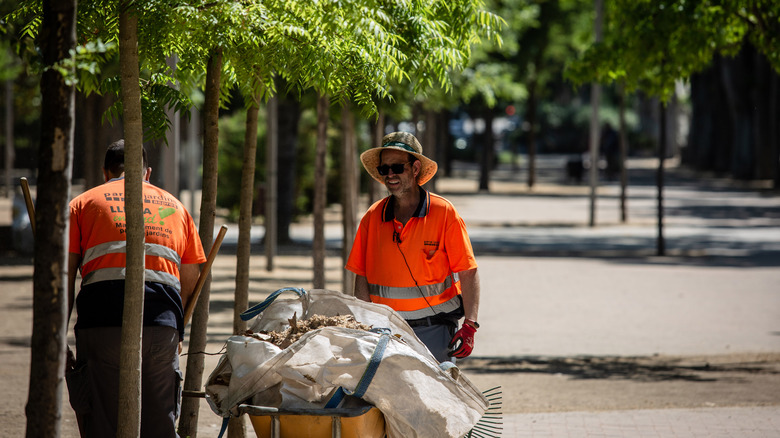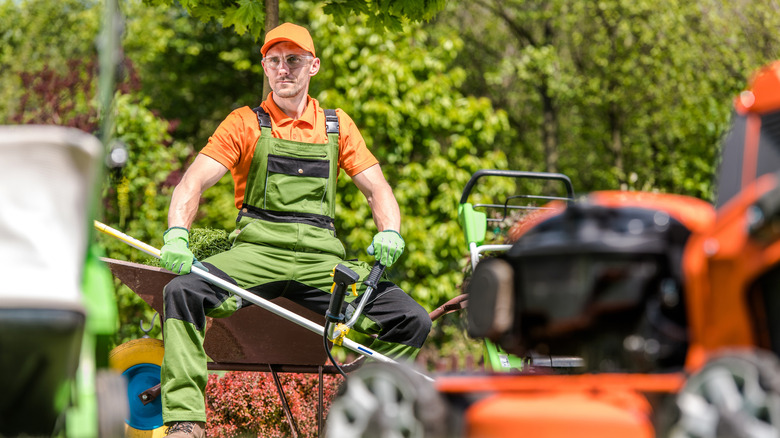How To Know If A Landscaper Is Taking Advantage Of You
Landscaping work is an essential component of homeownership. Maintaining the yard can provide you with an improved home aesthetic and a greater sense of comfort and relaxation. Lawncare is a massive expenditure for the average American household, with more than $500 spent on lawncare per home, on average in 2017 (via Statista). It's no wonder then why landscaping companies exist in huge abundance across the U.S. (more than 632,000 in 2022, according to Ibis World).
With all these companies participating in the landscaping industry, it can be tough to find a professional that will do a great job with your lawn, and won't take advantage of you in the process. There are many technical aspects of proper lawncare, and in some of these areas, an unsuspecting homeowner might be caught off guard by an unscrupulous landscaper.
Fortunately, there are a number of ways to check in with your landscaping provider to ensure that you're getting the best service possible and a fair price to boot. In both simple and more nuanced areas of the care needs of your lawn, keeping up to date on the health of the various elements and layers that make up the overall landscaping can help ensure that you are being well cared for by your landscaper.
Communication is a big deal in lawncare
Landscapers engage in a significant number of jobs, both large and small. It's common to see a lawncare specialist mowing the lawn or removing weeds from the green spaces of a home. These are tasks that are easy to spot. A freshly mowed lawn looks dramatically different than one that's been growing for a while. Yet, fertilizer application, irrigation maintenance, and many other elements of the job can be harder to notice without spending time watching the team work or painstakingly inspecting the yard after they've packed up their equipment and left.
Rainmaster reports that poor communication is one of the big issues that homeowners face when working with less than stellar lawncare professionals. Communication troubles can be a product of busy schedules, but this feature of a working relationship can also come as a result of a lawncare service that isn't performing all of its required duties and charging full price anyway. Applying fertilizer to the lawn, for instance, may be done with a pellet mixture that's easy to see, but it can also come in liquid form, meaning that you'll either have to watch your provider apply it or trust that it actually happened.
Similarly, during times of the year when mowing doesn't take place every week, lack of communication may be a sign that your service provider isn't even bothering to come to your home to perform routine maintenance on the lawn.
Ask basic questions about the wellness and care routine of your lawn
Landscapers are, by nature, more adept at making improvements, alterations, and additions to a lawn than the average homeowner. These are professionals in the lawncare and landscaping space, and as a result should be highly knowledgeable about proper weeding schedules, mowing details, weeding needs, and planting guidelines for hedges, trees, flowers, and more.
One essential feature of a great landscaper is the willingness to speak with you about the job at hand. Going beyond simple communication, landscapers should be able to answer basic questions about your lawn and its health (via Rainmaster). This provides you, the client, with a few key pieces of information. First of all, a willingness to speak on care routines, planting guidance and other aspects of the job shows the expertise and knowledgeability of the professional and their team. This is a bedrock component of good landscaping service. A professional that doesn't know their own craft isn't one that you can rely on for a great service.
As well, showing their knowledge further illuminates the kind of business person that you're dealing with. A professional who will take the time to speak on these matters is one that will likely perform a high-quality service and will remain available to discuss additional tasks, answer questions that may arise, or perform routine maintenance for your home, if required.
Look for logos on shirts, company vehicles, and web addresses
Logos can say a lot about a company. They offer a look into the professionalism of the brand and feature iconography and wording that speaks to the company's priorities and self-assessed image. Yet branding among companies like landscapers sheds light on something even more important. Landscapers often work as self-employed small business owners. Some will work with larger operations as a contracted employee, or manage a few small teams that make the rounds each day.
Regardless of the structure of the organization you are working with, a cohesive logo, color scheme, and other uniform elements can signal that you are working with a legitimate business entity, according to Rockwater Farm. Logos signify a brand allegiance, and a landscaping team that arrives on your property without a uniform of sorts and matching branding on the truck or van should give you pause.
In many smaller communities around the country, neighborhood kids may perform much of the lawncare services that their neighbors require. These individuals won't organize as business owners or include insurance coverage, guaranteed timelines or windows for service, and many of the other elements that come along with a professional service (but they can often cut the grass and edge with great skill). When hiring a professional, there is a heightened expectation of service and professionalism. If the landscapers don't sport this telltale sign of business professionalism, you may be working with the wrong team.
Verbal agreements are to be avoided at all costs
In landscaping, it might seem like the work is straightforward and routine. This leads some homeowners to a false sense of security when it comes time to finalize the details of the contract. Simple lawncare and significant landscaping overhauls alike should always be started after a written contract is drawn up, agreed to, and signed, according to Rockwater Farm.
Upcounsel reports that verbal agreements are certainly legally binding, but it can be impossible to hold a contractor to the terms of the contract if they aren't put in writing. Verbal agreements hinge on honesty at all times, and from both parties. If a landscaper wants to work without a written contract, it's possible that they are looking to get paid for services and then renege on the agreement. With no written documentation to prove what the agreement included, it's immensely difficult to remedy a situation in which you've been taken advantage of.
In addition, written contracts protect the landscaper as well, providing them with written proof of the payment schedule, the terms of their work output, and more. Contractors of all types should always press for the use of written agreements; if yours doesn't, they are either naive or looking to pull one over on you. Either way, this is likely not the kind of landscaping professional that you want to work with.
Pressure to pay upfront can signal a deeper problem
You might have to pay a deposit or down payment in order to secure the services of a landscaper or other professional if there is a requirement to purchase supplies ahead of the job's effective start. But these are typically a small dollar amount to help kickstart the project. A landscaper who is looking for a large down payment or the entire sum upfront is one that likely shouldn't be trusted (via Rockwater Farm). This is especially true for those seeking these arrangements, but with the stipulation of a cash payment rather than a transfer or card payment.
Pressure to close on a contract or insistence on an upfront payment that goes beyond a standard down payment should raise significant red flags in your mind. These are the kinds of tactics employed by scammers that are looking to get paid and then walk away without performing any work. Alternatively, paying upfront disincentivizes a landscaper from working hard for their earnings. If your landscaper is able to extract a large portion of the payout (or all of it) upfront, then you lose the ability to reject the quality of work while withholding money from the contractor until they remedy the problem. A landscaping company that's already been paid can phone it in and then walk away from the project with little consequence.





